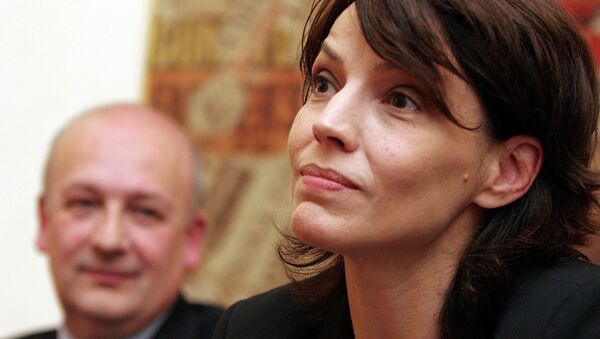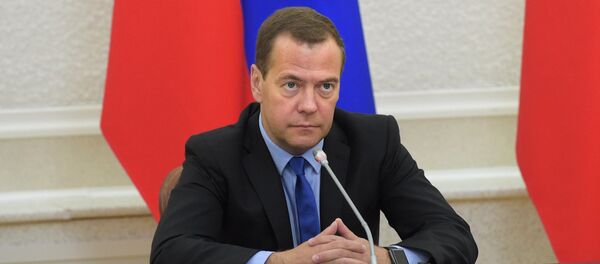“I am confident that by the end of the year or at beginning of 2016, a delegation of prominent Members of the European Parliament will visit [Russian State] Duma and Russian government counterparts,” Gardini told Sputnik.
Gardini expressed hope that this visit will bring forward a positive practical change in bilateral relations between Russia and the EU, which recently worsened amid the Ukrainian crisis.
On July 23-24, a delegation of 10 French parliamentarians visited the Black Sea peninsula of Crimea that reunified with Russia in 2014, where they met with local officials, despite the French Foreign Ministry calling the trip a violation of international law.
More and more members of the European Parliament are willing to join a newly-formed informal group For New Dialogue with Russia Elisabetta Gardini said.
In late June, Nadine Morano, a former French Minister for Apprenticeship and Professional Formation and current member of the center-right Union for a Popular Movement (UMP) party created an international working group in the EU Parliament to promote constructive dialogue with Russia. Named For New Dialogue With Russia, it currently consists of 15 members drawn from France, Italy, the United Kingdom, Germany and Portugal.
“More and more members of the European Parliament are convinced that the EU-Russia dialogue must be fostered and therefore it is hardly surprising that many members of every political hue and from different countries would like to join us [the group] for this action,” Gardini, who is also a former national spokesperson of Forza Italia, told Sputnik.
The group is drawn from representatives of various Europeans states and of parliamentarians with differing political views, emphasizing its importance, Russian envoy to the European Union Vladimir Chizhov told Sputnik in an interview last week. He labeled the group “a good sign” for EU-Russia relations.
“Rumors suggest that the EU-Russia delegation from the European Parliament would be re-established again and this could maybe be the first success of For New Dialogue with Russia,” Gardini continued.
Relations between Russia and the European Union deteriorated over the crisis in Ukraine. Brussels, along with the United States and other Western nations, accused Moscow of fanning the flames, and imposed several rounds of sanctions against Russia. In June 2015, the sanctions were extended for additional six months.
In response to the prolongation, Moscow extended its retaliatory one-year food import ban introduced in August 2014 against the countries that targeted it with economic restrictions.
Italy, as Russia’s traditional partner, cannot continue following the EU policy and allow relations with Moscow to become worse, Italian member of the European Parliament said.
“The Italy-Russia relations have always been special not only due to the mutual economic benefits, but even because of cultural reasons. The tourism exchanges, with thousands of Russian citizens visiting Italy and vice versa, as well as the importance of Russia in our culture are just two of the several examples of how close is the bond between our countries,” Gardini, a former national spokesperson of Forza Italia, told Sputnik.
“For all these reasons we cannot allow ourselves to isolate Russia nor to keep it away from us,” she concluded.
Relations between Russia and the European Union deteriorated over the crisis in Ukraine. Accusing Moscow of alleged involvement, Brussels, along with the United States and other Western nations, imposed several rounds of sanctions against Russia. In June 2015, the sanctions were extended for an additional six months.
In response to the prolongation, Moscow extended the one-year food import ban it introduced in August 2014 against countries that targeted it with economic restrictions.
Gardini is a member of an informal group of some 15 members of the European Parliament called For New Dialogue with Russia, which aims to improve bilateral relations.
European small and medium businesses are suffering from EU anti-Russia sanctions, and efforts by both Moscow and Brussels are necessary to restore the partnership Elisabetta Gardini said.
“Many small and medium entrepreneurs that had built close commercial relations before the political crisis are the ones that are now suffering the most from the sanctions,” Gardini, who is also a former national spokesperson of Forza Italia, told Sputnik.
Larger companies are more stable and are able to compensate for market fluctuations by diversifying investments and assets, whereas for smaller businesses, “the damage could be hopelessly definitive,” Gardini explained.
“Initiatives that can help promote this dialogue should be welcomed in Moscow and Brussels alike,” she said.
Economic aspects of current EU-Russia relations “look daunting” today, the parliamentarian noted.
Gardini has been part of the EU-Russia delegation since 2008, and has traveled several times to Russia on diplomatic and economic missions.
Now, being part of the informal group of European parliamentarians promoting “a new dialogue with Russia,” Gardini is planning a visit to Russia and her counterparts by the year end to boost bilateral relations.
The European Union, along with the United States and other Western nations, imposed sanctions against Russia over its alleged involvement in the Ukrainian crisis. In June, the sanctions were extended for an additional six months.
In response to the extension, Moscow extended its one-year food import ban introduced in August 2014 against countries that targeted it with economic restrictions.



